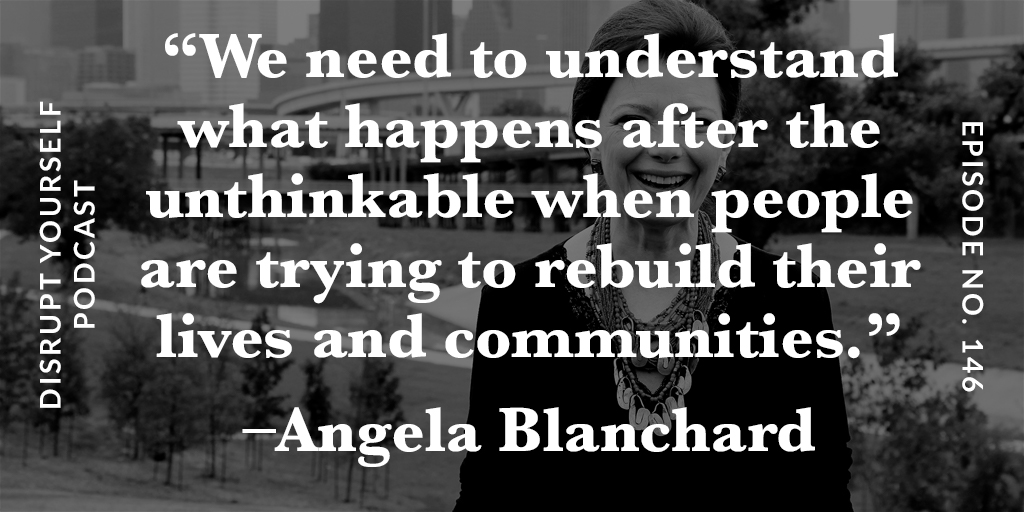Our guest today is Angela Blanchard, a globally recognized expert practitioner in community development, disaster recovery, and effective long-term integration for immigrants and refugees.
It may be sad to think about, but we have culturally become accustomed to seeing the immediate aftermath of natural disasters. Dramatic visuals of fleeing citizens, devastated buildings, and heroic rescues fill social media feeds for the days immediately following the unthinkable.
But that is not the end of the disaster.
Angela Blanchard’s life’s work revolves around communities and individuals who are trying to rebuild and rebirth themselves after disaster strikes. Recovery is not limited to a few weeks or months after the first newscast; most take years of hard work to even begin to heal. Angela has been in the trenches after the devastation of hurricanes, like Allison, Katrina, Rita, and she’s walked through fire-scorched earth in Australia. She’s helped establish shelters that have accommodated thousands of “guests” at a time—a term that Angela feels passionate about.
“One of the early rules I establish is we were only going to refer to the people in the shelter in Houston as either guests or neighbors. We were not going to use survivors, refugees, because they were, in fact, our guests… it was a reminder that the only thing separating the people coming through the front door and people coming through the back door to volunteer in Houston was, sometimes, just a block or two where the water hadn’t reached.”

I find Angela inspiring to listen to, not only because of her boots-on-the-ground dedication to helping others, but also because of her work as a professor at Brown University. She loves working with students and focusing on what they can do today, rather than worrying about creating entire social movements for tomorrow.
“[D]o what you can, with what you have, where you are right now…Have the ability to scan the environment, find the assets, resources, and strengths within the people around you. And then much like a gardener, how do we nurture and cultivate that into something larger and greater that includes and feeds more people.”
I love how she is teaching them to embrace their constraints and then START. Leveraging the accelerants of disruption to build those who have been disrupted. Inspiring!
Join us as we discuss the measure of a great city, the concept of “No one’s coming,” and how when everything is lost we can be the ones to stand in the gap and stabilize those who have been disrupted in unthinkable ways.
Listen to the episode in the player above, or download and enjoy it on Apple Podcasts. If you’re so inclined, please leave us a review!
Takeaways from this episode:
- While Angela didn’t know what she wanted to be when she grew up, she knew she wanted to grow up and leave (escape) her small-town life. She clearly remembers looking through books in the library and realizing how small the world she lived in really was, and desperately wanting to get out and see it all.
- Angela earned a degree in accounting and turned to the non-profit sector to see how she could help better allocate resources and realize potential within organizations. She landed at BakerRipley, a struggling non-profit, and focused on turning it into a healthy organization. “[W]e were evolving in response to [economic growth shifts in the Houston Region], being driven in with the aspirations of the people that we serve. And that adherence to what they hungered for, shaped the way we grew, and, also, what we designed as programs and as responses.” When she left the organization after 30 years, it’s annual operating budget was $300 million.
- Angela believes in three fundamental hungers: earn, learn, and belong. Cities magnetize for these hungers, and people come to cities.
- The best cities are those that have landing places and on-ramps, and don’t create “artificial pockets of isolation and desperation.”
- Aspiration can be the fuel for the growth of cities.
- What was once considered the responsibility of federal or international organizations is largely becoming the response of cities closer to home.
- In her travels internationally, Angela is not seeing grand federal programs becoming responsive to the needs of individuals. Instead, she is seeing people craft solutions “on the ground,” out of what’s available, and it is by nurturing those that are generous in spirit and willing to help that solutions are found.
- “There’s a pattern across the world, a buzz forming solutions in this improvisational way that really does speak to what’s gonna be required of leaders in the world, as the world we’re in now, and the one that we’ll be leading in for the next couple of years.”
- In the aftermath of disasters, it is important to use humanizing terms like “neighbors” and “guests” for those that are being helped, as “refugees” and “survivors” and similar phrases are “othering terms” and change the way we respond. Remembering they are people so close to ourselves reshapes the way we treat them.
- Angela has become well-known on the Brown University campus for saying “No one is coming…There’s nobody bigger, better, stronger, faster, better educated, better trained that’s going to show up in the middle of this disaster and fix it for you. It’s up to you. If you’re standing there, the person who cares deeply, with front row seat and knowledge, it’s up to you. And that’s a starting place.
Links Mentioned in this Episode:
- Angela Blanchard – Website | Twitter
- Disrupt Yourself Podcast – Episode 83: Saul Kaplan
- BakerRipley
- Disrupt Yourself Podcast – Episode 143: Simon Sinek
- “The Power of I’m Sorry” by Angela Blanchard
- “It’s Quiet Uptown” from Hamilton: An American Musical
- How Will You Measure Your Life? by Clayton Christensen, Karen Dillon and James Allworth
- Clayton Christensen, guru of disruptive innovation and Latter-day Saint leader, dies at 67

